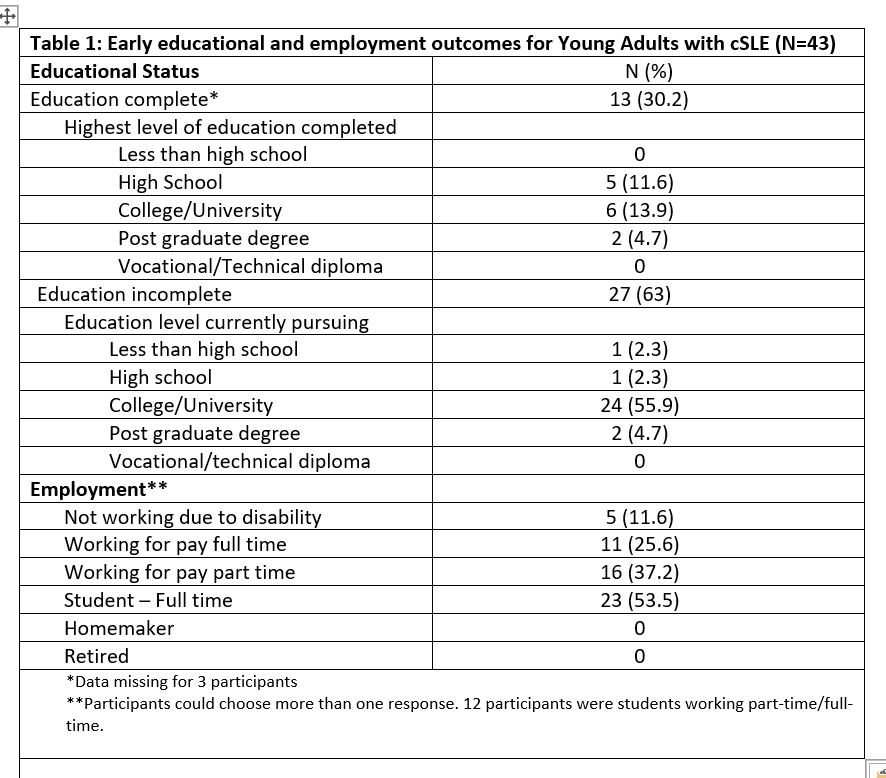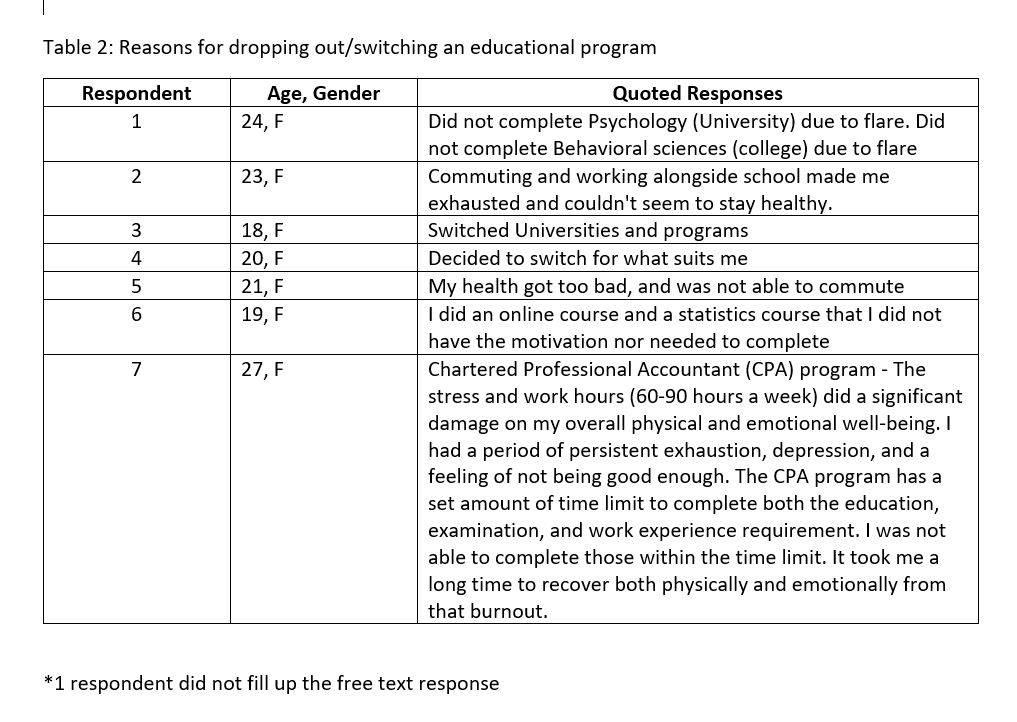Session Information
The 2020 Pediatric Rheumatology Symposium, originally scheduled for April 29 – May 2, was postponed due to COVID-19; therefore, abstracts were not presented as scheduled.
Date: Friday, May 1, 2020
Title: Poster Session 2
Session Type: ACR Abstract Session
Session Time: 5:00PM-6:00PM
Background/Purpose: The literature regarding educational and socioeconomic outcomes in young adults with childhood-onset Systemic Lupus Erythematosus (cSLE) are sparse. cSLE patients recently transitioned to adult care represent a vulnerable population at risk for poor clinical and psychosocial outcomes. Examining early educational and SES outcomes in these patients may yield insight into modifiable factors.
Objectives: To determine the educational status, employment and quality of life (QOL) indicators in a cohort of young adults with cSLE recently transitioned to adult care.
Methods: We conducted a cross-sectional study of patients diagnosed with SLE < 18y (cSLE) who graduated from the Hospital for Sick Children and were currently receiving care at a Young Adult SLE clinic at Mount Sinai Hospital, Toronto. Participants were invited to complete online REDCap questionnaires regarding educational status, employment, and income bracket. A free text-entry question collected responses regarding reasons for incompletion of an educational course. QOL indicators included Patient-Reported Outcomes Measurement Information System (PROMIS) measures for anxiety, depression, applied cognition and global health. Demographic and clinical data were obtained by retrospective chart review at both centers. Descriptive statistics were used to describe demographic, clinical and socioeconomic characteristics of the cohort. PROMIS scores were computed as T-scores using the online Health Measures Scoring Service.
Results: To date, a total of 47 patients have been invited to participate in the study, of which 43 completed the survey (response rate: 91%). Of these, 38 (88%) were female and majority were of Asian ethnicity (n=19(44%)). Median age of the cohort at time of questionnaire completion was 20 years (IQR:2.25). Median age at cSLE diagnosis was 14 years (IQR: 4.5), and median SLE disease duration was 7 years (IQR: 4).
27/43 (62.7%) patients had not completed their education, of which 1 (2.32%) was in high school, 24 (55.8%) were pursuing a college/university degree, 2 (4.7%) were enrolled in a postgraduate degree program and 1(2.32%) was in elementary school. 13 patients (30.2%) had completed their education and 3 responses were missing. 5/42 (11.90%) patients said they were not working due to disability, whereas 11/42 (26.19%) were working full time and 16/42 (38.10%) part-time. The overall employment rate was 62.9% in this cohort (Table 1). 38/43 responded to the question regarding not completing an educational program, of which 8 (21%) said they started an educational program but did not complete it (Table 2). In terms of QOL, the Mean T score for Applied Cognition was 49.72 (SD: 8.13), Global Health was 49.04 (SD: 2.72), Anxiety was 54.49 (SD: 12.99) and Depression was 54.18 (SD: 11.22), with 50 being the mean T score of the reference population.
Conclusion: Majority of the patients in this cohort of young adults with cSLE were pursuing post-secondary education, were employed and had QOL scores within 1 SD of the reference population. A small number of patients stated disease related causes for dropping out or switching an educational program. Further patient enrollment and data collection is currently ongoing.
To cite this abstract in AMA style:
Dhanrajani A, Silverman E, Knight A, Levy D, Steiman A. Educational Outcomes in a Young-Adult Cohort of Patients with Childhood Onset Systemic Lupus Erythematosus (SLE) [abstract]. Arthritis Rheumatol. 2020; 72 (suppl 4). https://acrabstracts.org/abstract/educational-outcomes-in-a-young-adult-cohort-of-patients-with-childhood-onset-systemic-lupus-erythematosus-sle/. Accessed .« Back to 2020 Pediatric Rheumatology Symposium
ACR Meeting Abstracts - https://acrabstracts.org/abstract/educational-outcomes-in-a-young-adult-cohort-of-patients-with-childhood-onset-systemic-lupus-erythematosus-sle/


